Terrance Dicks, Doctor Who writer/script editor, dies
 Terrance Dicks, script editor of Doctor Who from 1968-1974, and writer of many episodes of the show both during and after that time, dies at the age of 84. He first took on Doctor Who script editing duties during the Patrick Troughton years under producer Derrick Sherwin, culminating in taking over as co-writer of an epic ten-part finale for the second Doctor, The War Games, when two other planned scripts fell through on very short notice. In incoming producer Barry Letts and frequent writer Malcolm Hulke, Dicks found a kindred spirits keen to introduce real-world issues into Doctor Who’s storytelling, resulting in what many fans of the original series regard as a golden age for the series. During the break between the 1973 and 1974 seasons, Dicks and Letts collaborated on an original science fiction series, Moonbase 3, which lasted a single season. When Tom Baker took over from Jon Pertwee, Dicks was succeeded by his protege (and frequent Doctor Who writer) Robert Holmes as the script editor, and then wrote numerous stories of his own, including Baker’s debut story, Robot, The Brain Of Morbius, The Horror Of Fang Rock, State Of Decay, and The Five Doctors. After Doctor Who ceased to exist as an active BBC production in the 1990s, Dicks contributed scripts to numerous commercial (but largely fan-made) direct-to-video productions, such as Shakedown, Mindgame, and Mindgame Trilogy. He also wrote for Space: 1999, Big Finish Productions, and the vast majority of Target Books’ voluminous output of Doctor Who novelizations in the 1970s and ’80s, based upon both his own scripts and those of other scriptwriters, which may ironically be the work for which he is ultimately best known.
Terrance Dicks, script editor of Doctor Who from 1968-1974, and writer of many episodes of the show both during and after that time, dies at the age of 84. He first took on Doctor Who script editing duties during the Patrick Troughton years under producer Derrick Sherwin, culminating in taking over as co-writer of an epic ten-part finale for the second Doctor, The War Games, when two other planned scripts fell through on very short notice. In incoming producer Barry Letts and frequent writer Malcolm Hulke, Dicks found a kindred spirits keen to introduce real-world issues into Doctor Who’s storytelling, resulting in what many fans of the original series regard as a golden age for the series. During the break between the 1973 and 1974 seasons, Dicks and Letts collaborated on an original science fiction series, Moonbase 3, which lasted a single season. When Tom Baker took over from Jon Pertwee, Dicks was succeeded by his protege (and frequent Doctor Who writer) Robert Holmes as the script editor, and then wrote numerous stories of his own, including Baker’s debut story, Robot, The Brain Of Morbius, The Horror Of Fang Rock, State Of Decay, and The Five Doctors. After Doctor Who ceased to exist as an active BBC production in the 1990s, Dicks contributed scripts to numerous commercial (but largely fan-made) direct-to-video productions, such as Shakedown, Mindgame, and Mindgame Trilogy. He also wrote for Space: 1999, Big Finish Productions, and the vast majority of Target Books’ voluminous output of Doctor Who novelizations in the 1970s and ’80s, based upon both his own scripts and those of other scriptwriters, which may ironically be the work for which he is ultimately best known.
Peter Mayhew, actor, dies
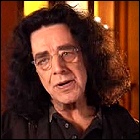 Actor Peter Mayhew, who went from a job as a hospital orderly to co-starring in the Star Wars films as Chewbacca, dies at the age of 74. Following filming on Star Wars, with no way to anticipate the movie’s upcoming blockbuster success, Mayhew returned to his orderly job, continuing that line of work after the filming of both 1980‘s The Empire Strikes Back and 1983‘s Return Of The Jedi, before becoming a full-time fixture at Star Wars and science fiction conventions (and, later, the internet, regaling fans with behind-the-scenes stories both in person and online). He had some prior monster-suit-acting experience before George Lucas hired him for Star Wars, but not enough to amount to a steady stream of work. He reprised the role of Chewie in 2005‘s Revenge Of The Sith and 2015‘s The Force Awakens before handing the Wookiee suit off to former basketball player Joonas Suotamo, but still received a consulting credit for 2017‘s The Last Jedi, coaching Suotamo during filming. He had also put on the Wookiee suit for any number of promotional appearances, playing the character on The Muppet Show and Donny & Marie, as well as the infamous 1978 Star Wars Holiday Special, which afforded Chewie a larger role than some of the movies did.
Actor Peter Mayhew, who went from a job as a hospital orderly to co-starring in the Star Wars films as Chewbacca, dies at the age of 74. Following filming on Star Wars, with no way to anticipate the movie’s upcoming blockbuster success, Mayhew returned to his orderly job, continuing that line of work after the filming of both 1980‘s The Empire Strikes Back and 1983‘s Return Of The Jedi, before becoming a full-time fixture at Star Wars and science fiction conventions (and, later, the internet, regaling fans with behind-the-scenes stories both in person and online). He had some prior monster-suit-acting experience before George Lucas hired him for Star Wars, but not enough to amount to a steady stream of work. He reprised the role of Chewie in 2005‘s Revenge Of The Sith and 2015‘s The Force Awakens before handing the Wookiee suit off to former basketball player Joonas Suotamo, but still received a consulting credit for 2017‘s The Last Jedi, coaching Suotamo during filming. He had also put on the Wookiee suit for any number of promotional appearances, playing the character on The Muppet Show and Donny & Marie, as well as the infamous 1978 Star Wars Holiday Special, which afforded Chewie a larger role than some of the movies did.
Owen K. Garriott, astronaut, dies
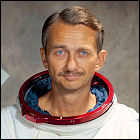 Skylab and Space Shuttle astronaut Owen K. Garriott dies at the age of 88. Born in Oklahoma, former U.S. Navy electronics officer Garriott went on to Stanford University to pursue a doctorate, and returned to Stanford to teach physics and electronics until 1965, when he was selected by NASA as one of the first “scientist astronauts” for future Apollo and Apollo Applications Program missions. (Only one scientist astronaut, Harrison Schmitt, flew to the moon before the Apollo program’s budgetary lunar wings were clipped by the Nixon administration.) Garriott first flew to space in 1973 as part of the second Skylab long-duration crew, staying in orbit for a record-setting two months with his two crewmates, and flew as a mission specialist aboard the first Space Shuttle mission to carry the Spacelab laboratory module into orbit in 1983. Both before and after his second and final flight, he was involved in consulting on the ever-changing design for a planned space station, which, after many changes, evolved into the International Space Station. He was the father of Richard Garriott, designer of the Ultima computer adventure game series who later visited the ISS as a space tourist aboard a Soyuz flight; they were the first father/son astronauts in America (preceded only by cosmonauts Alexander and Sergei Volkov).
Skylab and Space Shuttle astronaut Owen K. Garriott dies at the age of 88. Born in Oklahoma, former U.S. Navy electronics officer Garriott went on to Stanford University to pursue a doctorate, and returned to Stanford to teach physics and electronics until 1965, when he was selected by NASA as one of the first “scientist astronauts” for future Apollo and Apollo Applications Program missions. (Only one scientist astronaut, Harrison Schmitt, flew to the moon before the Apollo program’s budgetary lunar wings were clipped by the Nixon administration.) Garriott first flew to space in 1973 as part of the second Skylab long-duration crew, staying in orbit for a record-setting two months with his two crewmates, and flew as a mission specialist aboard the first Space Shuttle mission to carry the Spacelab laboratory module into orbit in 1983. Both before and after his second and final flight, he was involved in consulting on the ever-changing design for a planned space station, which, after many changes, evolved into the International Space Station. He was the father of Richard Garriott, designer of the Ultima computer adventure game series who later visited the ISS as a space tourist aboard a Soyuz flight; they were the first father/son astronauts in America (preceded only by cosmonauts Alexander and Sergei Volkov).
Luke Perry, actor, dies
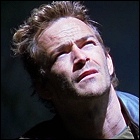 Actor Luke Perry, at the time a current regular on the CW’s Riverdale series and a former teen heartthrob from his years as one of the stars of Fox’s Beverly Hills 90210 throughout the 1990s, dies at the age of 52 several days after suffering from a major stroke. Among his many high-profile series roles were HBO’s acclaimed prison drama Oz, and the starring role in Jeremiah, Showtime’s early 21st century adaptation of a popular post-apocalyptic comic book, adapted by Babylon 5 creator J. Michael Straczynski. He also had a minor part in the 1997 genre cult classic The Fifth Element, and was one of the stars of the 1992 movie Buffy The Vampire Slayer, upon which the later TV series was based. His first TV role – albeit uncredited – was in an episode of 1982’s short-lived time travel series Voyagers!.
Actor Luke Perry, at the time a current regular on the CW’s Riverdale series and a former teen heartthrob from his years as one of the stars of Fox’s Beverly Hills 90210 throughout the 1990s, dies at the age of 52 several days after suffering from a major stroke. Among his many high-profile series roles were HBO’s acclaimed prison drama Oz, and the starring role in Jeremiah, Showtime’s early 21st century adaptation of a popular post-apocalyptic comic book, adapted by Babylon 5 creator J. Michael Straczynski. He also had a minor part in the 1997 genre cult classic The Fifth Element, and was one of the stars of the 1992 movie Buffy The Vampire Slayer, upon which the later TV series was based. His first TV role – albeit uncredited – was in an episode of 1982’s short-lived time travel series Voyagers!.
More about Jeremiah in the LogBook and theLogBook.com Store
Jeremiah now streaming on Amazon Prime
W. Morgan Sheppard, actor, dies
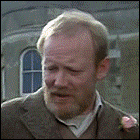 British-born actor William Morgan Sheppard, a genre casting favorite ever since his 1985 appearance as Blank Reg in the original Max Headroom TV movie (a role that permanently relocated him to the United States for the U.S. Max Headroom series), dies at the age of 86 in Los Angeles. With his wizened features (the result of a surgical procedure that cost him one of his eyes), classical stage training, and distinctive, vaguely-Irish-accented voice, Sheppard would go on to appear in Star Trek: The Next Generation, Elvira: Mistress Of The Dark, Quantum Leap, Star Trek VI, seaQuest DSV, Babylon 5 (a series in which he was a close runner-up for the role of G’Kar), Star Trek: Voyager, Doctor Who, and the 2009 Star Trek movie relaunch. He was the father of actor Mark Sheppard, a genre favorite in his own right, with whom he appeared in both Doctor Who and NCIS, playing older and younger versions of the same character. Prior to leaving the U.K., Sheppard had appeared in such series as The New Avengers, Hammer House Of Horror, and Day Of The Triffids.
British-born actor William Morgan Sheppard, a genre casting favorite ever since his 1985 appearance as Blank Reg in the original Max Headroom TV movie (a role that permanently relocated him to the United States for the U.S. Max Headroom series), dies at the age of 86 in Los Angeles. With his wizened features (the result of a surgical procedure that cost him one of his eyes), classical stage training, and distinctive, vaguely-Irish-accented voice, Sheppard would go on to appear in Star Trek: The Next Generation, Elvira: Mistress Of The Dark, Quantum Leap, Star Trek VI, seaQuest DSV, Babylon 5 (a series in which he was a close runner-up for the role of G’Kar), Star Trek: Voyager, Doctor Who, and the 2009 Star Trek movie relaunch. He was the father of actor Mark Sheppard, a genre favorite in his own right, with whom he appeared in both Doctor Who and NCIS, playing older and younger versions of the same character. Prior to leaving the U.K., Sheppard had appeared in such series as The New Avengers, Hammer House Of Horror, and Day Of The Triffids.
Donald Moffat, actor, dies
 British-born actor Donald Moffat, who left England for the United States in 1956, dies at the age of 87 due to complications from a stroke he had recently suffered. A frequent face on American TV and film for decades, Moffat was a regular on the short-lived TV adaptation of Logan’s Run, in which he played the benevolent android Rem, and was a member of the ensemble cast of John Carpenter’s The Thing. He also portrayed President Lyndon B. Johnson in Philip Kaufman’s 1984 adaptation The Right Stuff, and appeared in countless other movies and TV series, including guest stints on The Six Million Dollar Man and the 1980s Twilight Zone, working steadily into the early 2000s before retiring.
British-born actor Donald Moffat, who left England for the United States in 1956, dies at the age of 87 due to complications from a stroke he had recently suffered. A frequent face on American TV and film for decades, Moffat was a regular on the short-lived TV adaptation of Logan’s Run, in which he played the benevolent android Rem, and was a member of the ensemble cast of John Carpenter’s The Thing. He also portrayed President Lyndon B. Johnson in Philip Kaufman’s 1984 adaptation The Right Stuff, and appeared in countless other movies and TV series, including guest stints on The Six Million Dollar Man and the 1980s Twilight Zone, working steadily into the early 2000s before retiring.
Stan Lee, Marvel Comics editor, dies
 Marvel Comics’ most famous editor (and arguably its most famous creator, to the chagrin of some of the artists with whom he worked), Stan Lee, dies at the age of 95, several months after announcing that his days of attending conventions and making public appearances were over. Born in 1922, he began working at Timely Publications mere months after the company’s formation, thanks to a family connection with the company’s publisher, and became interim editor of Timely’s comics output in 1941. Timely had already seen success with artist/writer Jack Kirby’s Captain America, and Lee would not really make his mark until after a three-year sabbatical during which he enlisted in the U.S. Army and turned his talents to writing material supporting the war effort. It was during the early 1960s that Lee’s real influence on the company begin to be known, collaborating with Kirby on The Fantastic Four, Iron Man, The Incredible Hulk, Thor, X-Men, and others, and co-creating The Amazing Spider-Man and Doctor Strange with artist Steve Ditko. Under Lee’s editorship, Marvel led a revolution in interpreting comic book superheroes as complex, multifaceted, and flawed individuals, many of which remained bankable enough properties to lead to Disney’s 2009 acquisition of the company and rapid expansion of movie and TV adaptations of numerous characters and titles.
Marvel Comics’ most famous editor (and arguably its most famous creator, to the chagrin of some of the artists with whom he worked), Stan Lee, dies at the age of 95, several months after announcing that his days of attending conventions and making public appearances were over. Born in 1922, he began working at Timely Publications mere months after the company’s formation, thanks to a family connection with the company’s publisher, and became interim editor of Timely’s comics output in 1941. Timely had already seen success with artist/writer Jack Kirby’s Captain America, and Lee would not really make his mark until after a three-year sabbatical during which he enlisted in the U.S. Army and turned his talents to writing material supporting the war effort. It was during the early 1960s that Lee’s real influence on the company begin to be known, collaborating with Kirby on The Fantastic Four, Iron Man, The Incredible Hulk, Thor, X-Men, and others, and co-creating The Amazing Spider-Man and Doctor Strange with artist Steve Ditko. Under Lee’s editorship, Marvel led a revolution in interpreting comic book superheroes as complex, multifaceted, and flawed individuals, many of which remained bankable enough properties to lead to Disney’s 2009 acquisition of the company and rapid expansion of movie and TV adaptations of numerous characters and titles.
Douglas Rain, actor, dies
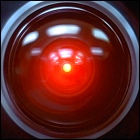 Classically trained Canadian actor Douglas Rain, best known to science fiction fans as the voice of the HAL-9000 computer in 2001: a space odyssey and 2010: The Year We Make Contact, dies at the age of 90. A veteran of the Canadian stage, Mr. Rain was a founding member of the Stratford Festival, and played a variety of parts over 45 years in Stratford, Ontario, some of which led to him reprising those performances on film. It was his narration of a 1960 documentary that got the attention of 2001 director Stanley Kubrick, who hired him to provide narration, an element that was eventually jettisoned before the movie’s release. Kubrick had, in fact, initially hired American actor Martin Balsam to voice HAL, but felt that Balsam’s performance was perhaps too emotional for the ship’s computer. Mr. Rain was enlisted to replace all of HAL’s lines in ten hours of marathon recording sessions in late 1967, long after shooting had wrapped; he claimed never to have seen the final result.
Classically trained Canadian actor Douglas Rain, best known to science fiction fans as the voice of the HAL-9000 computer in 2001: a space odyssey and 2010: The Year We Make Contact, dies at the age of 90. A veteran of the Canadian stage, Mr. Rain was a founding member of the Stratford Festival, and played a variety of parts over 45 years in Stratford, Ontario, some of which led to him reprising those performances on film. It was his narration of a 1960 documentary that got the attention of 2001 director Stanley Kubrick, who hired him to provide narration, an element that was eventually jettisoned before the movie’s release. Kubrick had, in fact, initially hired American actor Martin Balsam to voice HAL, but felt that Balsam’s performance was perhaps too emotional for the ship’s computer. Mr. Rain was enlisted to replace all of HAL’s lines in ten hours of marathon recording sessions in late 1967, long after shooting had wrapped; he claimed never to have seen the final result.
Gary Kurtz, Star Wars producer, dies
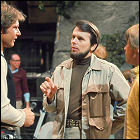 Gary Kurtz, producer of Star Wars and The Empire Strikes Back and George Lucas’ right-hand man during the making of both movies, dies at the age of 78 after a year-long battle with cancer. Kurtz was instrumental in the deal-making behind both Star Wars and its predecessor, Lucas’ American Graffiti, initially pitching both to Universal Studios. While Universal was eager to make American Graffiti, they passed on Star Wars, which was then pitched to 20th Century Fox. Kurtz was literally in the Death Star trenches helping Lucas complete the first film, directing many second-unit shots (including many of the X-Wing cockpit scenes from the movie’s climactic battle) and riding herd on the somewhat overburdened Industrial Light & Magic. Fundamental differences over the storytelling choices Lucas was making for Return Of The Jedi led Kurtz to distance himself from Lucasfilm, and he would go on to produce such films as The Dark Crystal, Return To Oz, and Slipstream.
Gary Kurtz, producer of Star Wars and The Empire Strikes Back and George Lucas’ right-hand man during the making of both movies, dies at the age of 78 after a year-long battle with cancer. Kurtz was instrumental in the deal-making behind both Star Wars and its predecessor, Lucas’ American Graffiti, initially pitching both to Universal Studios. While Universal was eager to make American Graffiti, they passed on Star Wars, which was then pitched to 20th Century Fox. Kurtz was literally in the Death Star trenches helping Lucas complete the first film, directing many second-unit shots (including many of the X-Wing cockpit scenes from the movie’s climactic battle) and riding herd on the somewhat overburdened Industrial Light & Magic. Fundamental differences over the storytelling choices Lucas was making for Return Of The Jedi led Kurtz to distance himself from Lucasfilm, and he would go on to produce such films as The Dark Crystal, Return To Oz, and Slipstream.
Brad Smith, Voyager imaging team lead, dies
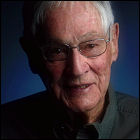 Bradford A. Smith, a research astronomer and former professor of planetary science and astronomy at the University of Arizona, dies at the age of 86 from complications arising from an autoimmune disorder. Smith became a public figure during the peak years of the uncrewed Voyager missions in the 1970s and ’80s, where, as the head of the imaging team for Voyagers 1 and 2, it fell to him to interpret freshly-received images from the outer planets and their moons for the press and the public, combining authoritative knowledge with a dry sense of humor at press conferences. Smith had reshaped the specs for Voyager’s onboard cameras since the mission was given the go-ahead in 1972, not only pushing for more powerful telescopic optics, but going out of his way to hire geologists and planetary science experts who could interpret the geological processes shaping the moons of Jupiter, Saturn, Uranus and Neptune from photos alone. When the moons of Jupiter greeted Voyager’s cameras with recently-reshaped surfaces and active volcanoes, that decision paid off. Prior to the Voyager mission, Smith had also been involved with imaging science in the Mariner and Viking missions to Mars, as well as helping to shape the specs for the planetary camera being developed for the yet-to-be-launched Hubble Space Telescope and advising imaging teams working on later missions.
Bradford A. Smith, a research astronomer and former professor of planetary science and astronomy at the University of Arizona, dies at the age of 86 from complications arising from an autoimmune disorder. Smith became a public figure during the peak years of the uncrewed Voyager missions in the 1970s and ’80s, where, as the head of the imaging team for Voyagers 1 and 2, it fell to him to interpret freshly-received images from the outer planets and their moons for the press and the public, combining authoritative knowledge with a dry sense of humor at press conferences. Smith had reshaped the specs for Voyager’s onboard cameras since the mission was given the go-ahead in 1972, not only pushing for more powerful telescopic optics, but going out of his way to hire geologists and planetary science experts who could interpret the geological processes shaping the moons of Jupiter, Saturn, Uranus and Neptune from photos alone. When the moons of Jupiter greeted Voyager’s cameras with recently-reshaped surfaces and active volcanoes, that decision paid off. Prior to the Voyager mission, Smith had also been involved with imaging science in the Mariner and Viking missions to Mars, as well as helping to shape the specs for the planetary camera being developed for the yet-to-be-launched Hubble Space Telescope and advising imaging teams working on later missions.
Chuck McCann, actor, dies
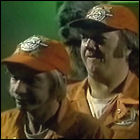 Comedian and actor Chuck McCann, a familiar TV face from his start in children’s television in New York in the 1950s to his near-ubiquity in both television shows and commercials in the 1970s and 1980s, dies of congestive heart failure at the age of 83. He continued to be a fixture on children’s television nationally, including a stint on the Sid & Marty Krofft Saturday morning kids’ sci-fi comedy Far Out Space Nuts in 1975, of which he was also co-creator. McCann’s voice could also be heard in numerous animated TV series, including Pac-Man and Animaniacs; he was the voice of The Thing in the animated Fantastic Four series.
Comedian and actor Chuck McCann, a familiar TV face from his start in children’s television in New York in the 1950s to his near-ubiquity in both television shows and commercials in the 1970s and 1980s, dies of congestive heart failure at the age of 83. He continued to be a fixture on children’s television nationally, including a stint on the Sid & Marty Krofft Saturday morning kids’ sci-fi comedy Far Out Space Nuts in 1975, of which he was also co-creator. McCann’s voice could also be heard in numerous animated TV series, including Pac-Man and Animaniacs; he was the voice of The Thing in the animated Fantastic Four series.
Soon-Teck Oh, actor, dies
 Korean-born actor Soon-Teck Oh dies as a result of a chronic illness at the age of 85. Arriving in the United States in 1959 as a college graduate with a degree in international relations, he was drawn into show business, gaining high visibility in the 1974 James Bond film The Man With The Golden Gun. He guest starred on countless American TV series, including The Invaders, The Wild Wild West, Night Gallery, Search, Logan’s Run, The Greatest American Hero, Highlander, Time Trax, Babylon 5, Stargate SG-1, and Seven Days, to name just some of his genre credits.
Korean-born actor Soon-Teck Oh dies as a result of a chronic illness at the age of 85. Arriving in the United States in 1959 as a college graduate with a degree in international relations, he was drawn into show business, gaining high visibility in the 1974 James Bond film The Man With The Golden Gun. He guest starred on countless American TV series, including The Invaders, The Wild Wild West, Night Gallery, Search, Logan’s Run, The Greatest American Hero, Highlander, Time Trax, Babylon 5, Stargate SG-1, and Seven Days, to name just some of his genre credits.
Steven Bochco, writer, dies
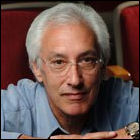 Legendary television writer/producer Steven Bochco dies at the age of 74. Widely associated with TV police dramas, including the genre-changing shows Hill Street Blues and NYPD Blue, Bochco created numerous popular series, including L.A. Law and Doogie Howser M.D. He also had numerous genre credits, ranging from co-writing the 1972 sci-fi cult classic Silent Running (a very early entry in his career), to co-creating (with Harve Bennett) two 1970s TV iterations of H.G. Wells’ timeless story, The Invisible Man and Gemini Man. He also wrote an episode of the 1980s revival of The Twilight Zone, and created a series pilot, NYPD 2069, which aired as a one-off TV movie in 2004. (Another series pilot, Vampire, went no further than the pilot stage in 1979.)
Legendary television writer/producer Steven Bochco dies at the age of 74. Widely associated with TV police dramas, including the genre-changing shows Hill Street Blues and NYPD Blue, Bochco created numerous popular series, including L.A. Law and Doogie Howser M.D. He also had numerous genre credits, ranging from co-writing the 1972 sci-fi cult classic Silent Running (a very early entry in his career), to co-creating (with Harve Bennett) two 1970s TV iterations of H.G. Wells’ timeless story, The Invisible Man and Gemini Man. He also wrote an episode of the 1980s revival of The Twilight Zone, and created a series pilot, NYPD 2069, which aired as a one-off TV movie in 2004. (Another series pilot, Vampire, went no further than the pilot stage in 1979.)
Professor Stephen Hawking, physicist, dies
 Widely regarded as one of the 20th and 21st centuries’ finest minds in the fields of theoretical physics and cosmology, Professor Stephen Hawking dies at the age of 76, having suffered from ALS (better known as Lou Gehrig’s Disease) for over 50 years. He far outlived the few years he was expected to live when he was diagnosed in 1963. In that time, he co-authored a 1970 paper which referred back to Einstein’s Theory of General Relativity to lend great credibility to the then-new (and not widely accepted) theory of the universe’s origins in a “big bang”. Later that same year he began working on research that would eventually lead to the theory that black holes would emit a signature radiation, dubbed Hawking radiation, though those emissions had yet to be observed directly at the time of Hawking’s death. His best-selling 1988 book, “A Brief History Of Time”, propelled Hawking (and his remarkable survival story) into the public eye, though by this time he was wheelchair-bound and reliant on a speech synthesizer to communicate with others.
Widely regarded as one of the 20th and 21st centuries’ finest minds in the fields of theoretical physics and cosmology, Professor Stephen Hawking dies at the age of 76, having suffered from ALS (better known as Lou Gehrig’s Disease) for over 50 years. He far outlived the few years he was expected to live when he was diagnosed in 1963. In that time, he co-authored a 1970 paper which referred back to Einstein’s Theory of General Relativity to lend great credibility to the then-new (and not widely accepted) theory of the universe’s origins in a “big bang”. Later that same year he began working on research that would eventually lead to the theory that black holes would emit a signature radiation, dubbed Hawking radiation, though those emissions had yet to be observed directly at the time of Hawking’s death. His best-selling 1988 book, “A Brief History Of Time”, propelled Hawking (and his remarkable survival story) into the public eye, though by this time he was wheelchair-bound and reliant on a speech synthesizer to communicate with others.
Leonid Kadeniuk, astronaut, dies
 Ukrainian-born Space Shuttle astronaut Leonid Kadeniuk, who entered the Soviet-era cosmonaut corps in 1976 but didn’t fly in space until 1997, dies at the age of 67. The first Ukrainian national to fly in space, Kadeniuk was a member of the STS-87 crew, a microgravity science mission aboard Columbia during which he performed experiments on vegetation in zero gravity. Following his single flight into space, Kadeniuk spent a few years continuing to try to build Ukraine’s space program, before becoming involved in politics in the 21st century.
Ukrainian-born Space Shuttle astronaut Leonid Kadeniuk, who entered the Soviet-era cosmonaut corps in 1976 but didn’t fly in space until 1997, dies at the age of 67. The first Ukrainian national to fly in space, Kadeniuk was a member of the STS-87 crew, a microgravity science mission aboard Columbia during which he performed experiments on vegetation in zero gravity. Following his single flight into space, Kadeniuk spent a few years continuing to try to build Ukraine’s space program, before becoming involved in politics in the 21st century.
Richard Gordon, astronaut, dies
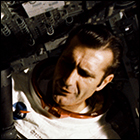 Gemini and Apollo astronaut Richard “Dick” Gordon dies at the age of 88. A veteran of the record-setting Gemini 11 mission (during which he undertook a spacewalk at the unprecedented altitude of 850 miles above Earth’s surface) and the Apollo 12 mission (during which he manned the command module Yankee Clipper while crewmates Pete Conrad and Alan Bean walked on the moon), Gordon was a naval aviator who eventually graduated to test pilot duties, eventually specializing in the F4H Phantom II fighter and teaching other pilots how to fly it. After his Apollo flight and retirement from NASA, Gordon kept working in the technology and engineering industries, but also diversified, becoming Executive VP of the New Orleans Saints football team.
Gemini and Apollo astronaut Richard “Dick” Gordon dies at the age of 88. A veteran of the record-setting Gemini 11 mission (during which he undertook a spacewalk at the unprecedented altitude of 850 miles above Earth’s surface) and the Apollo 12 mission (during which he manned the command module Yankee Clipper while crewmates Pete Conrad and Alan Bean walked on the moon), Gordon was a naval aviator who eventually graduated to test pilot duties, eventually specializing in the F4H Phantom II fighter and teaching other pilots how to fly it. After his Apollo flight and retirement from NASA, Gordon kept working in the technology and engineering industries, but also diversified, becoming Executive VP of the New Orleans Saints football team.
Dudley Simpson, composer, dies
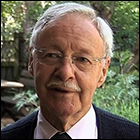 Dudley Simpson, the Australian-born veteran BBC composer whose sound defined Doctor Who in the 1960s and ’70s, as well as such series as Blake’s 7, The Tomorrow People, Moonbase 3, and many others, dies at the age of 95. Simpson scored his first Doctor Who serial, the second season opener Planet Of Giants, in 1964 at a time when the series often relied on stock music. He solidified his position as Doctor Who’s house composer during the Troughton era, scoring pivotal stories such as The Evil Of The Daleks, The Ice Warriors and The War Games, and became the dominant musical sound of the series during the Pertwee and Tom Baker eras, during which he provided all but a handful of original scores and stock music fell by the wayside. It was only when incoming producer John Nathan-Turner took over as Doctor Who’s showrunner in 1980 that Simpson’s Doctor Who tenure ended. He retired to Australia in the 1990s.
Dudley Simpson, the Australian-born veteran BBC composer whose sound defined Doctor Who in the 1960s and ’70s, as well as such series as Blake’s 7, The Tomorrow People, Moonbase 3, and many others, dies at the age of 95. Simpson scored his first Doctor Who serial, the second season opener Planet Of Giants, in 1964 at a time when the series often relied on stock music. He solidified his position as Doctor Who’s house composer during the Troughton era, scoring pivotal stories such as The Evil Of The Daleks, The Ice Warriors and The War Games, and became the dominant musical sound of the series during the Pertwee and Tom Baker eras, during which he provided all but a handful of original scores and stock music fell by the wayside. It was only when incoming producer John Nathan-Turner took over as Doctor Who’s showrunner in 1980 that Simpson’s Doctor Who tenure ended. He retired to Australia in the 1990s.
Paul Weitz, astronaut, dies
 Former NASA astronaut Paul J. Weitz dies at the age of 85 after battling cancer. Originally assigned to an Apollo lunar mission that was cancelled, Weitz’s first spaceflight was as the pilot of the first manned mission to the Skylab space station, which had suffered critical damage during launch. Weitz and crewmates Pete Conrad and Joe Kerwin had to undertake risky spacewalks to salvage the station, and stayed in orbit for 28 days, an endurance record in 1973. Weitz returned to orbit as the commander of Space Shuttle Challenger‘s first flight in 1983, and remained at NASA until 1994.
Former NASA astronaut Paul J. Weitz dies at the age of 85 after battling cancer. Originally assigned to an Apollo lunar mission that was cancelled, Weitz’s first spaceflight was as the pilot of the first manned mission to the Skylab space station, which had suffered critical damage during launch. Weitz and crewmates Pete Conrad and Joe Kerwin had to undertake risky spacewalks to salvage the station, and stayed in orbit for 28 days, an endurance record in 1973. Weitz returned to orbit as the commander of Space Shuttle Challenger‘s first flight in 1983, and remained at NASA until 1994.
Deborah Watling, actress, dies
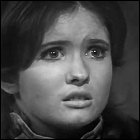 Actress Deborah Watling, best known for her 1960s stint as Victoria Waterfield, an orphaned girl taken aboard the TARDIS as a companion in Doctor Who, dies at the age of 69 from lung cancer, only six weeks after being diagnosed. Joining the show in the pivotal Evil Of The Daleks serial in 1967, and remaining through the end of the six-part Fury From The Deep in 1968, Watling was technically a series regular for only a year, though that time coincided with a run of stories now widely regarded as classics, pitting the TARDIS team again Cybermen, Ice Warriors and Yeti. She also appeared in Out Of The Unknown and Danger UXB, and reprised the role of Victoria in later Doctor Who projects such as Dimensions In Time (1993) and Downtime (1995).
Actress Deborah Watling, best known for her 1960s stint as Victoria Waterfield, an orphaned girl taken aboard the TARDIS as a companion in Doctor Who, dies at the age of 69 from lung cancer, only six weeks after being diagnosed. Joining the show in the pivotal Evil Of The Daleks serial in 1967, and remaining through the end of the six-part Fury From The Deep in 1968, Watling was technically a series regular for only a year, though that time coincided with a run of stories now widely regarded as classics, pitting the TARDIS team again Cybermen, Ice Warriors and Yeti. She also appeared in Out Of The Unknown and Danger UXB, and reprised the role of Victoria in later Doctor Who projects such as Dimensions In Time (1993) and Downtime (1995).
George Romero, director, dies
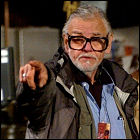 Pioneering horror film director George A. Romero dies at the age of 77 after a battle with lung cancer. In 1968, his low-budget shocker Night Of The Living Dead all but gave birth to the zombie horror genre. Some of his later films attempted to tackle different subject matter, meeting with box office indifference until he returned to the zombie genre with Dawn Of The Dead (1976), which earned back more than 100 times its production budget. High-profile works after that included the Stephen King-written Creepshow (1982), Monkey Shines (1988), and a third film in his zombie cycle, Day Of The Dead (1985). Sticking this time with his connection to the genre, Romero continued to be involved in spinoffs for comics, internet shorts, and further films, including Road Of The Dead, a movie he promoted shortly before his death. His movies remain immensely influential in the horror genre.
Pioneering horror film director George A. Romero dies at the age of 77 after a battle with lung cancer. In 1968, his low-budget shocker Night Of The Living Dead all but gave birth to the zombie horror genre. Some of his later films attempted to tackle different subject matter, meeting with box office indifference until he returned to the zombie genre with Dawn Of The Dead (1976), which earned back more than 100 times its production budget. High-profile works after that included the Stephen King-written Creepshow (1982), Monkey Shines (1988), and a third film in his zombie cycle, Day Of The Dead (1985). Sticking this time with his connection to the genre, Romero continued to be involved in spinoffs for comics, internet shorts, and further films, including Road Of The Dead, a movie he promoted shortly before his death. His movies remain immensely influential in the horror genre.
Martin Landau, actor, dies
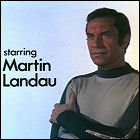 Oscar-winning actor Martin Landau, a fixture of genre TV and movies since the late 1950s, dies at the age of 89. The star of such series as Mission: Impossible and Space: 1999, Landau was also a renowned acting teacher, and was in demand both before and after his TV heyday with roles in North By Northwest, Crimes And Misdemeanors, and Ed Wood, in which his portrayal of Bela Lugosi in his waning years brought him an Academy Award. He worked steadily through his eighties, in both on-screen roles and voice roles, with some projects yet to be released at the time of his death.
Oscar-winning actor Martin Landau, a fixture of genre TV and movies since the late 1950s, dies at the age of 89. The star of such series as Mission: Impossible and Space: 1999, Landau was also a renowned acting teacher, and was in demand both before and after his TV heyday with roles in North By Northwest, Crimes And Misdemeanors, and Ed Wood, in which his portrayal of Bela Lugosi in his waning years brought him an Academy Award. He worked steadily through his eighties, in both on-screen roles and voice roles, with some projects yet to be released at the time of his death.
Trevor Baxter, actor, dies
 British actor Trevor Baxter, best known in genre circles for a one-off appearance in the 1970s Doctor Who story The Talons Of Weng-Chiang as Professor George Litefoot, dies at the age of 84. Though his guest role on Doctor Who lasted six half-hour episodes, his double-act chemistry with fellow guest star Christopher Benjamin was memorable enough that there was brief discussion at the BBC of possibly launching the two Victorian-era characters in their own TV spinoff. That idea was quickly shelved, but Big Finish Productions, the makers of audio Doctor Who, would revive it in the 21st century, leading to the popular audio series Jago & Litefoot, which ran for nearly a decade. Baxter’s list of guest starring roles spans almost the entirety of classic British TV, and he acted on stage on the West End and with the Royal Shakespeare Company. He was also a prolific playwright in his own right.
British actor Trevor Baxter, best known in genre circles for a one-off appearance in the 1970s Doctor Who story The Talons Of Weng-Chiang as Professor George Litefoot, dies at the age of 84. Though his guest role on Doctor Who lasted six half-hour episodes, his double-act chemistry with fellow guest star Christopher Benjamin was memorable enough that there was brief discussion at the BBC of possibly launching the two Victorian-era characters in their own TV spinoff. That idea was quickly shelved, but Big Finish Productions, the makers of audio Doctor Who, would revive it in the 21st century, leading to the popular audio series Jago & Litefoot, which ran for nearly a decade. Baxter’s list of guest starring roles spans almost the entirety of classic British TV, and he acted on stage on the West End and with the Royal Shakespeare Company. He was also a prolific playwright in his own right.
Stephen Furst, actor & director, dies
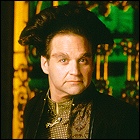 Actor and director Stephen Furst, well-known to the American viewing public as hapless Flounder from the 1970s frat movie Animal House and as Dr. Axelrod from St. Elsewhere, dies at the age of 63 from complications from a long battle with diabetes. Furst co-starred as much-put-upon Centauri diplomatic aide Vir Cotto in all five seasons of the 1990s science fiction series Babylon 5; he also directed episodes of Babylon 5 and its follow-up, Crusade, as well as voicing Booster in the animated Toy Story TV spinoff, Buzz Lightyear Of Star Command. He also directed (sometimes under a pseudonym) such Syfy original movies as Path Of Destruction and Basilisk: The Serpent King.
Actor and director Stephen Furst, well-known to the American viewing public as hapless Flounder from the 1970s frat movie Animal House and as Dr. Axelrod from St. Elsewhere, dies at the age of 63 from complications from a long battle with diabetes. Furst co-starred as much-put-upon Centauri diplomatic aide Vir Cotto in all five seasons of the 1990s science fiction series Babylon 5; he also directed episodes of Babylon 5 and its follow-up, Crusade, as well as voicing Booster in the animated Toy Story TV spinoff, Buzz Lightyear Of Star Command. He also directed (sometimes under a pseudonym) such Syfy original movies as Path Of Destruction and Basilisk: The Serpent King.
Adam West, actor, dies
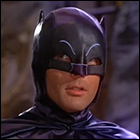 Actor Adam West, forever known to millions as the star of TV’s Batman in the 1960s, dies at the age of 88 after a short bout with leukemia. After years of paying his dues with guest starring roles, bit parts and commercial appearances, West beat out actors such as Lyle Waggoner for the role of Batman, but after three seasons on TV and a movie produced by the makers of the TV series, Batman had run its course, and West found himself battling typecasting, accepting work in subpar projects and returning to the role of Batman both as voice work (for the Super Friends animated series) and live action (the lamentable 1979 Legends Of The Superheroes specials). Voice work became a mainstay of West’s career, and he landed a long-running recurring role on Seth MacFarlane’s Family Guy animated series.
Actor Adam West, forever known to millions as the star of TV’s Batman in the 1960s, dies at the age of 88 after a short bout with leukemia. After years of paying his dues with guest starring roles, bit parts and commercial appearances, West beat out actors such as Lyle Waggoner for the role of Batman, but after three seasons on TV and a movie produced by the makers of the TV series, Batman had run its course, and West found himself battling typecasting, accepting work in subpar projects and returning to the role of Batman both as voice work (for the Super Friends animated series) and live action (the lamentable 1979 Legends Of The Superheroes specials). Voice work became a mainstay of West’s career, and he landed a long-running recurring role on Seth MacFarlane’s Family Guy animated series.
Jared Martin, actor, dies
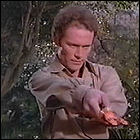 Actor Jared Martin, star of the cult classic genre series The Fantastic Journey and War Of The Worlds, dies of pancreatic cancer at the age of 75. In the 1960s, Martin had the good fortune to befriend and room with fellow college student Brian De Palma, and was given a role in some of De Palma’s early films. He moved on to roles in such movies as Westworld, though he may best be known for a recurring role in the prime time soap Dallas. After leaving acting as a full-time profession, he continued to mentor younger filmmakers, especially those coming from disadvantaged backgrounds.
Actor Jared Martin, star of the cult classic genre series The Fantastic Journey and War Of The Worlds, dies of pancreatic cancer at the age of 75. In the 1960s, Martin had the good fortune to befriend and room with fellow college student Brian De Palma, and was given a role in some of De Palma’s early films. He moved on to roles in such movies as Westworld, though he may best be known for a recurring role in the prime time soap Dallas. After leaving acting as a full-time profession, he continued to mentor younger filmmakers, especially those coming from disadvantaged backgrounds.
Douglas Netter, Babylon 5 producer, dies
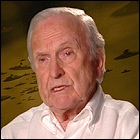 Douglas Netter, the executive producer of the science fiction series Babylon 5 and its various spinoffs after the series’ run, from Crusade through the 2007 direct-to-DVD project Babylon 5: The Lost Tales, dies at the age of 96. A former executive vice president of MGM in the early 1970s, Netter also produced such TV projects as The Sacketts, Five Mile Creek, Hypernauts, and Captain Power, the series which introduced him to future Babylon 5 creator J. Michael Straczynski.
Douglas Netter, the executive producer of the science fiction series Babylon 5 and its various spinoffs after the series’ run, from Crusade through the 2007 direct-to-DVD project Babylon 5: The Lost Tales, dies at the age of 96. A former executive vice president of MGM in the early 1970s, Netter also produced such TV projects as The Sacketts, Five Mile Creek, Hypernauts, and Captain Power, the series which introduced him to future Babylon 5 creator J. Michael Straczynski.
Bill Paxton, actor, dies
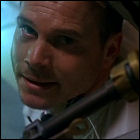 Actor Bill Paxton, who played both starring and supporting roles in movies such as Aliens, The Terminator, Predator 2, Weird Science, Apollo 13, Twister, and Tombstone, dies at the age of 61. Paxton worked behind the scenes in the early years of his career, alternating between working for legendary B-movie director Roger Corman, and playing small roles on screen. He directed the film clip for the Barnes & Barnes song “Fish Heads” (which was co-written and performed by Bill Mumy). Paxton died from complications that arose during heart surgery.
Actor Bill Paxton, who played both starring and supporting roles in movies such as Aliens, The Terminator, Predator 2, Weird Science, Apollo 13, Twister, and Tombstone, dies at the age of 61. Paxton worked behind the scenes in the early years of his career, alternating between working for legendary B-movie director Roger Corman, and playing small roles on screen. He directed the film clip for the Barnes & Barnes song “Fish Heads” (which was co-written and performed by Bill Mumy). Paxton died from complications that arose during heart surgery.
Richard Hatch, actor, dies
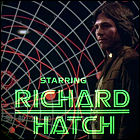 Actor Richard Hatch, who starred in the 1970s series Battlestar Galactica as Captain Apollo and then took on the new role of Tom Zarek in the show’s longer-running early 2000s re-imagining, dies of pancreatic cancer at the age of 71. Both before and after his starring turn as Apollo, Hatch was a mainstay of 1970s and ’80s TV, with guest appearances in The Love Boat, CHiPS, Fantasy Island, MacGyver, T.J. Hooker and Baywatch. In 1999 he unsuccessfully pitched a Galactica revival to Universal Studios, based loosely on a line of post-TV-series novels he co-authored earlier in the ’90s. He also played a key role in the Star Trek fan film Prelude To Axanar, and was set to reprise his role in a feature-length fan project continuing its story.
Actor Richard Hatch, who starred in the 1970s series Battlestar Galactica as Captain Apollo and then took on the new role of Tom Zarek in the show’s longer-running early 2000s re-imagining, dies of pancreatic cancer at the age of 71. Both before and after his starring turn as Apollo, Hatch was a mainstay of 1970s and ’80s TV, with guest appearances in The Love Boat, CHiPS, Fantasy Island, MacGyver, T.J. Hooker and Baywatch. In 1999 he unsuccessfully pitched a Galactica revival to Universal Studios, based loosely on a line of post-TV-series novels he co-authored earlier in the ’90s. He also played a key role in the Star Trek fan film Prelude To Axanar, and was set to reprise his role in a feature-length fan project continuing its story.
John Hurt, actor, dies
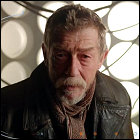 British actor Sir John Hurt, renowned for memorable roles in everything from I, Claudius to Alien to The Elephant Man to 1984 to Doctor Who, dies at the age of 77 after a long battle with pancreatic cancer (during which he kept actively working). Known to genre fans for the role of unlucky astronaut Kane in Ridley Scott’s Alien (1979), though before this he had lent his voice to animated adaptations of Lord Of The Rings and Watership Down. He spoofed his Alien character for Mel Brooks’ Spaceballs in 1987. Other genre fare included the movie adaptation of Carl Sagan’s novel Contact in 1997, V For Vendetta, Indiana Jones And The Kingdom Of The Crystal Skull, the final two Harry Potter movies, and voiced the dragon in the BBC’s TV series Merlin. In 2013, he joined the pantheon of incarnations of the Doctor for Doctor Who’s 50th anniversary, playing a previously unseen incarnation of the Time Lord, a role he reprised for Big Finish Productions’ Doctor Who audio plays.
British actor Sir John Hurt, renowned for memorable roles in everything from I, Claudius to Alien to The Elephant Man to 1984 to Doctor Who, dies at the age of 77 after a long battle with pancreatic cancer (during which he kept actively working). Known to genre fans for the role of unlucky astronaut Kane in Ridley Scott’s Alien (1979), though before this he had lent his voice to animated adaptations of Lord Of The Rings and Watership Down. He spoofed his Alien character for Mel Brooks’ Spaceballs in 1987. Other genre fare included the movie adaptation of Carl Sagan’s novel Contact in 1997, V For Vendetta, Indiana Jones And The Kingdom Of The Crystal Skull, the final two Harry Potter movies, and voiced the dragon in the BBC’s TV series Merlin. In 2013, he joined the pantheon of incarnations of the Doctor for Doctor Who’s 50th anniversary, playing a previously unseen incarnation of the Time Lord, a role he reprised for Big Finish Productions’ Doctor Who audio plays.
Masaya Nakamura, Namco founder, dies
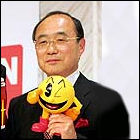 Masaya Nakamura, the founder of pioneering Japanese video game maker Namco, dies at the age of 91. Founded in 1955 as Nakamura Manufacturing Co., Namco was an early proponent of video game development in Japan, though it saw its earliest successes as the Japanese distributor of Atari arcade games imported from the U.S. After moderately successful early coin-ops such as Gee Bee, Namco quickly established itself as a global powerhouse with the release of such perennial classics as Pac-Man, Galaxian, Galaga, Dig Dug, Pole Position, and Xevious, among many others. Namco’s growth in the 1980s was so explosive that it absorbed Japanese film studio Nikkatsu in 1993 (several of whose titles Nakamura oversaw as executive producer), and later merged with Bandai in 2005.
Masaya Nakamura, the founder of pioneering Japanese video game maker Namco, dies at the age of 91. Founded in 1955 as Nakamura Manufacturing Co., Namco was an early proponent of video game development in Japan, though it saw its earliest successes as the Japanese distributor of Atari arcade games imported from the U.S. After moderately successful early coin-ops such as Gee Bee, Namco quickly established itself as a global powerhouse with the release of such perennial classics as Pac-Man, Galaxian, Galaga, Dig Dug, Pole Position, and Xevious, among many others. Namco’s growth in the 1980s was so explosive that it absorbed Japanese film studio Nikkatsu in 1993 (several of whose titles Nakamura oversaw as executive producer), and later merged with Bandai in 2005.